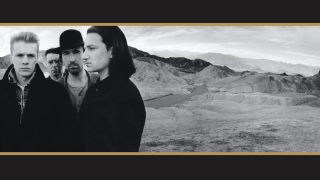I remember when it came out, hearing it for the first time 30 years ago. I was playing in a pop band and we were about to soundcheck, and somebody played a record over the speakers before we started and I was just gobsmacked. I didn’t care about the gig anymore, I just sat there transfixed for about six or seven minutes going, ‘This is stunning. Absolutely stunning’. It was Where The Streets Have No Name, and I’d never heard anything like it in my life – it just blew my head off. I knew of U2 before that, but I knew them as a punky, rough and ready kind of band. The Joshua Tree completely turned that on its head, and they became this cinematic stadium band.
I think bringing on Brian Eno and Daniel Lanois to produce it had a huge impact on the record. I come from a prog rock background, and they were dabbling in prog – not in the Genesis, Yes sense – but just the scale of it, the cinematic feel, and the widescreen version of the sound. It wasn’t what you associated with them at the time, with New Years Day and all their earlier stuff that had a real raw edge to it. I wasn’t a huge fan of that. I always loved Bono’s singing, and there was something about the guitar, but with this album it all came together, and every track is like gold.
It was such a strange album to come from them. It came from nowhere, and it was so unusual. Even hearing it now, it stands the test of time. They used a lot more keyboard on it; there are bits where, with Brian Eno in particular, you can tell what he was doing. Making these soundscapes, and that matched with Bono’s vocal – that emotion paired with the cinematic soundscape is just magical.
It was such a shock at the time to hear that from U2 that you had to play it a few times to get into it. The more I played it, the more I got into it, and as much as I enjoyed it at the time, it’s gotten better with age. You hear the tracks in isolation now and appreciate them even more – they’re like antique bits of furniture! I Still Haven’t Found What I’m Looking For – oh, my god, there’s just something about that song.
I’m not a great fan of lyrics. Coming from a prog background, the lyrics are always secondary – it’s always the guitars, solos and all that rubbish; the lyrics get in the way of everything else – but as I got older and listened to this record, I realised the lyrics on it are absolutely stunning. They mean a lot.
The Joshua Tree is a strange one in my record collection. It stands out from the rest [of my albums], but it’s really influenced the way I write. U2 as a band, more generally speaking, what I love about them is that if you took the bass player and the drummer from that band and put them in another band… I don’t think it’d work. People say ‘Oh, he just plays one beat’ or ‘The bass line just pumps this continuous thing’, but my god, it doesn’t half work within that line up. It gives The Edge the room to do what he does, and the groove of that rhythm section is just incredible. To a prog musician, ‘Oh, my god, it’s simple, anyone can play that’, it’s like Ringo in the Beatles; they all said he was a terrible drummer, but that’s the whole point of it. With U2 records, they’ve got such a groove because they’re doing what drummers are meant to do: make you want to tap your foot and move to the music. You’ve got The Edge doing all that stuff over the top, but without that drummer and bass player doing what they do, it wouldn’t work. It’s the combination of the four.
In prog, it’s all about how clever you can be. What I take from U2 and desperately try to bring into my music, under the cover of darkness so no one realises it’s there, is to bring that hypnotic drum and bass backbone that prog music lacks. Too often prog doesn’t groove, it doesn’t move, because it spends too much time being arty farty. Within loads of stuff I do, I sneakily bring in loads of U2. Sometimes people notice it, but most of the time they don’t; it’s just there and it works.
Where they went with Achtung Baby was another huge milestone for me. Along their career I loved the fact that they changed, that one album could be one thing, and the next album they ripped it up and did whatever they felt like doing. You can hear on this album, that’s what they did then. They thought, ‘Right, we’re known for doing New Year’s Day and Sunday Bloody Sunday, but we’re going to rip up all that and we’re going to do this big, cinematic, widescreen album’. I love that. You don’t know what you’re going to get from album to album.
The Joshua Tree is such an influential record. For them and for the fans it was a turning point. If they hadn’t have made that record, they would have just been another new, tail-end of punk, average band. The Joshua Tree upped their game, and it was a masterstroke to bring in Daniel Lanois and Brian Eno. It’s such an important record for them, and for everyone, really. It still doesn’t get the praise it deserves.
Rob Reed's Favourite Welsh Prog Bands
Rob Reed: "Half of Mike Oldfield’s fans think I’m a saviour!"

